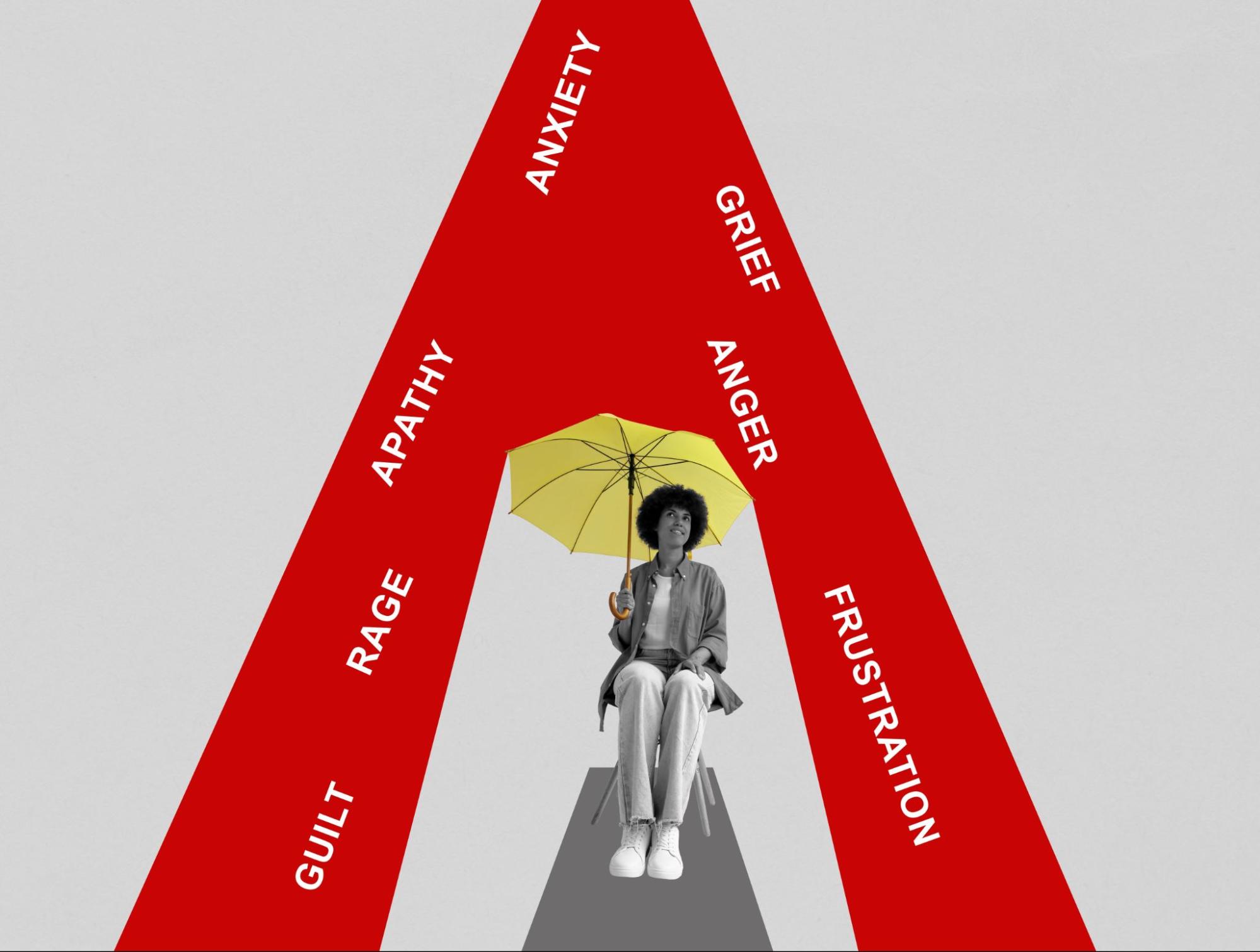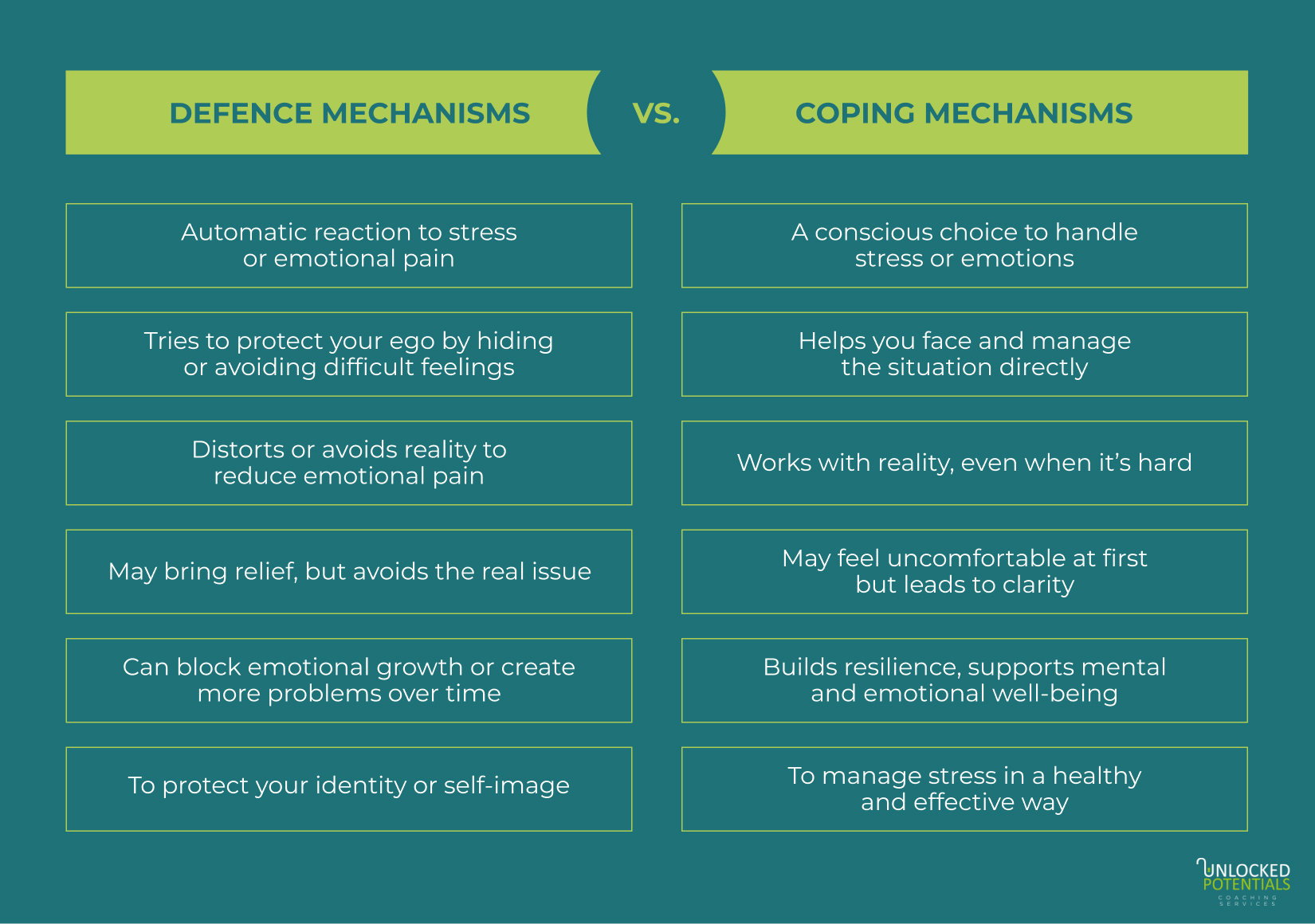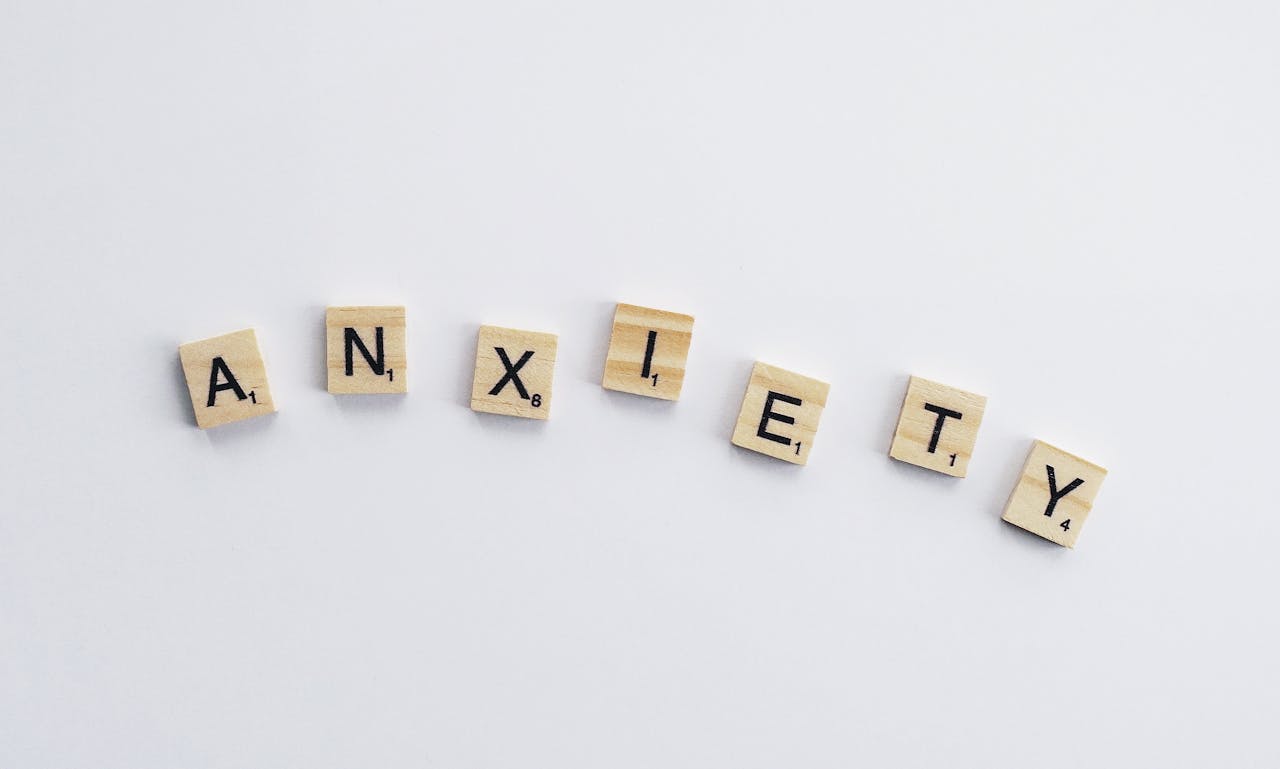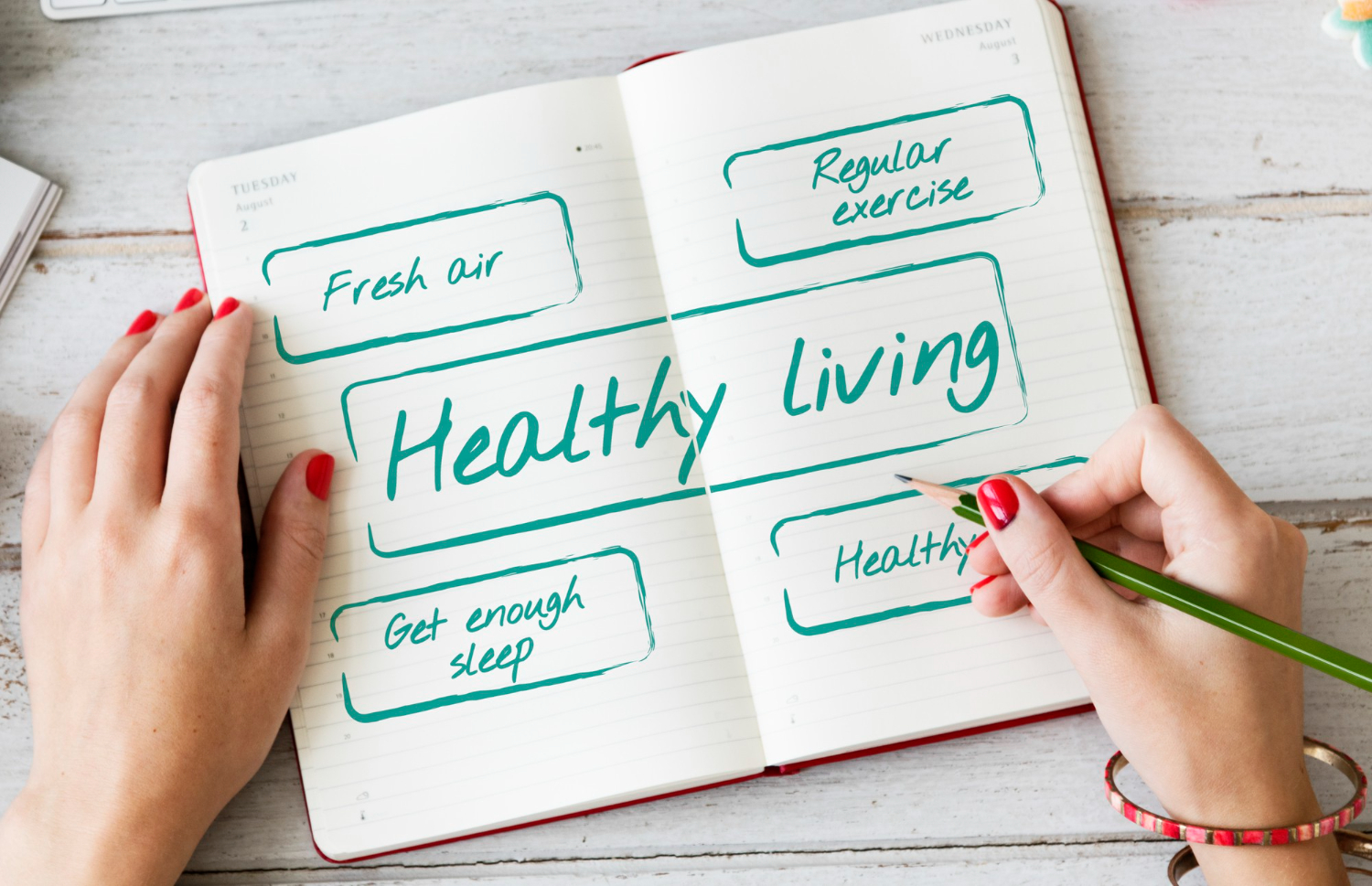Types of Coping Mechanisms and How to Be Emotionally Resilient

Coping mechanism is a general term used to describe how individuals respond to or handle negative or overwhelming emotions, like stress, anxiety, and grief. It refers to our behaviours or reactions that allow us to calm down and remain functional during difficult situations.
There are different types of coping mechanisms, but they can be classified into five main styles depending on how you process the situation or information. There are also dysfunctional and healthy ways to cope. Dysfunctional coping mechanisms include destructive thoughts and behaviours that may offer temporary relief but are harmful to health and well-being in the long run. On the other hand, healthy coping mechanisms are sustainable skills that enable us to build emotional resilience and overcome adversity.
What Is a Coping Mechanism?
A coping mechanism is something we do, either on purpose or without realising, to help us deal with stress, strong emotions, or difficult situations. It can be a thought, a behaviour, or a habit we use to make ourselves feel better or to manage what’s happening around us. Everyone uses coping mechanisms in one way or another. It’s a natural part of being human.
Sometimes, we use these strategies when we feel overwhelmed, anxious, sad, or angry. Other times, they help us manage everyday stress, like work pressure, relationship problems, or sudden changes. Coping mechanisms give us a way to stay calm or feel more in control when life becomes too much.
Some coping mechanisms are conscious, we know we’re using them. For example, we might take a walk to clear our heads, call a friend, or write in a journal. At other times, coping can be unconscious; we may not realise we’re doing it, such as ignoring a problem or snapping at someone without meaning to.
It’s important to know that not all coping mechanisms are helpful. There are two main kinds:
- Healthy (or adaptive) coping mechanisms help us deal with challenges in a way that supports our well-being.
- Unhealthy (or dysfunctional) coping mechanisms may provide short-term relief but often create more problems in the long run. They can affect our mental, emotional, or physical health.
Understanding how we cope and being honest about which strategies we use is a big step towards building emotional resilience. When we learn to choose healthier ways to respond to stress, we can handle life’s ups and downs with more clarity and strength. And that’s something we can all work on, no matter where we are right now.
Defense Mechanisms vs. Coping Mechanisms
Both coping and defense mechanisms enable individuals to deal with stress and other uncomfortable emotions. However, their long-term effects on health and well-being differentiate them from each other.
Defense mechanisms are unconscious techniques that only arise when confronted with stress, whether internal or external. They are behaviours you are not aware of that distract you from a triggering situation, traumatic experience, or anything that threatens your identity. Defense mechanisms tend to distort or deny reality by repressing your emotions or projecting them onto other people.
Coping mechanisms are conscious efforts that allow individuals to manage or navigate challenging situations. While the goal is always to alleviate stress or discomfort, not all coping mechanisms are healthy or effective, as some may lead to more complications.
The 5 Main Types of Coping Mechanisms
To explain how the five main types of coping mechanisms vary from each other, we cited the same issue or problem as an example and provided alternate responses.
1. Emotion-Focused
Emotion-focused coping mechanisms involve managing how you feel toward a stressor instead of or before solving the problem. By shifting your attention to what you can change, you reduce emotional reactions to events beyond your control. You may not address the problem directly, but you’re at least able to lessen how it affects you.
Example: You receive a rejection letter for something you applied for. To deal with the situation, you unload your disappointments in a journal and then watch a movie to prevent yourself from dwelling on the problem or do other things to regain a positive disposition.
2. Problem-Focused
Problem-focused coping mechanisms involve facing or addressing the issue as it arises. They’re about defining the problem and finding solutions or alternative approaches to eliminate the stressor at its source.
Example: You receive a rejection letter for something you applied for. You identify points for self-improvement and try to avoid making the same mistakes.
3. Avoidance-Focused
Avoidance-focused coping mechanisms involve withdrawing from a present situation that is causing stress. Individuals with this coping style are inclined to seek distractions, procrastinate, or do anything else to steer clear of the issue or problem. While avoidance may offer instant relief, it is fleeting and may exacerbate stress, contributing to chronic anxiety, guilt, and low self-esteem.
Example: You receive a rejection letter for something you applied for. To avoid disappointment, you don’t apply for the same thing or do other things besides sending out applications.
4. Meaning-Focused
Meaning-focused coping mechanisms involve making sense of a stressful experience by finding a purpose or reason why it happened that could benefit them at present or in the future. They reinterpret the scenario and draw their perspectives from their beliefs and values, which could be personal, spiritual, cultural, or environmental.
Example: You receive a rejection letter for something you applied for. You believe everything happens for a reason, and that particular opportunity is not intended for you at this time, or you’re destined for something better.
5. Support-Seeking
Support-seeking coping mechanisms involve seeking emotional or instrumental assistance, guidance, or comfort from a social group, community, or licensed professional to manage stress and resolve a problem. Also called social coping, individuals may reach out to their family and friends, talk to a life coach or therapist, or participate in a support group to gain new insights or perspectives.
Example: You receive a rejection letter for something you applied for. You come to your family or friends for advice or to remind you that better opportunities are coming your way. You may also consider getting life coaching to clarify your goals and for tips on moving past setbacks and limitations.
Proactive Coping: Preparing Yourself Before the Storm
Proactive coping is about getting ready for challenges before they happen. Instead of only reacting when life becomes stressful, it means thinking ahead and taking steps to reduce stress in the future. It’s like carrying an umbrella when you see dark clouds, it may not be raining yet, but you’re prepared if it does.
Proactive coping doesn’t mean trying to control everything. Life is still unpredictable. But it gives you tools and a stronger mindset, so you’re not caught off guard. It can also help you build confidence. When you know you have a plan or a set of helpful habits in place, it can be easier to stay calm and focused.
Some examples of proactive coping include:
- Planning your schedule to avoid burnout
- Practising regular self-care, like sleep, movement, or time outdoors
- Learning to say no when your plate is already full
- Setting goals and working on them a little at a time
- Talking to someone you trust before things become overwhelming
By using proactive coping, you give yourself a better chance of staying balanced and in control, even when life gets tough. It’s not about avoiding stress completely, but about facing it with more strength and less fear. Like any skill, it takes practice, but it can make a big difference in how you handle life’s ups and downs.
Common Dysfunctional (Maladaptive) Coping Mechanisms
Dysfunctional coping mechanisms include destructive thoughts and behaviours that may offer temporary relief but are harmful to health and well-being in the long run. These are also referred to as ineffective or maladaptive coping strategies.
- Constant Busyness
To avoid dealing with stressful situations or uncomfortable emotions, individuals will constantly make themselves busy or unavailable.
- Over or Underreacting
Overreacting to a situation can indicate that an individual is struggling with pent-up emotions and overwhelmed by stress. They may yell, jump to conclusions, dramatize the situation, or lash out at people. Conversely, underreacting can mean you’re suppressing your emotions and pretending as if the problem does not exist. As a result, you fail to set boundaries, causing the negative situation to happen again or people taking advantage of you.
- Toxic Positivity
Toxic positivity involves trivializing or downplaying how bad a situation is. While having a positive outlook is good and admirable, you should still be able to acknowledge and validate negative emotions. Instead of disregarding negativity, grow from it.
- Overthinking
Overthinking is when you focus too much on the problem or overanalyse a situation. Instead of thinking of solutions, your thoughts devolve into an endless loop of worst-case scenarios, causing inaction or analysis paralysis. It is a coping mechanism common to those with anxiety and depression.
- Self-Isolation
Self-isolation involves withdrawing from your friends, family, and other social groups. It’s okay to embrace solitude to cool off or reflect, but prolonged isolation may push people away, preventing you from getting the help you need or maintaining healthy relationships.
- Perfectionism
Being a perfectionist can prevent you from responding to and managing setbacks effectively. You may feel helpless, stuck, and like a failure after not achieving your goals, but none of these feelings are accurate since everyone encounters obstacles in their journey to success. Your ego, pride, or stubbornness may inhibit you from asking for help or accepting that some things simply cannot and should not be accomplished alone.
- Venting
Venting may cause you to dwell on the issue, especially if you’re not talking to the right person. When you’re just ranting your problem to anyone willing to listen, you may not be open to exploring solutions. In some cases, the wrong person may magnify the issue or give poor advice, contributing to more stress. If you need support, seek individuals who have your best interests at heart and will inspire you to move forward with an impactful decision.
- Substance Abuse
To escape a stressful situation or numb themselves, some individuals may cope by smoking, drinking alcohol, or resorting to drug use.
- Procrastination
To avoid stress, some people procrastinate or delay tasks until the last minute, which may sacrifice the quality of work or cause them to miss deadlines.
- Eating Too Much or Too Little
Some people may overindulge their cravings or eat too much to distract themselves and compensate for the stress they’re feeling, contributing to obesity, diabetes, and heart disease, among other health conditions. On the other hand, some people lose their appetite when confronted by stress, eating too little, and denying their bodies the essential nutrients needed to function.
- Impulsive Spending
Some people handle stress by making impulsive purchases, causing them to spend way beyond their means and take on debt.
- Oversleeping
To avoid dealing with problems, some people seek comfort in their beds and sleep way more than they should. They wake up disappointed with unresolved issues, making them want to sleep again. This vicious cycle may eventually lead to depression.
- Self-Harm
To release negative emotions or distract themselves from intrusive thoughts, some people may inflict harm on themselves.
Examples of Healthy Coping Mechanisms
Healthy coping mechanisms are sustainable skills that enable us to build emotional resilience and overcome adversity. These are effective and adaptive coping strategies that do not have damaging consequences.
- Cognitive Reframing
Cognitive reframing is the process of shifting your negative perspective by replacing flawed thought patterns with more optimistic and realistic ones. It’s being able to acknowledge an overwhelming emotion before pivoting their attention to the positive aspects of their life.
- Meditation and Breathing Exercises
Meditation and breathing exercises can help quiet the mind, reducing stress while enabling your body to relax. These mindful practices allow you to regain control of your nervous system, regulate your emotions, and give you the clarity to handle or face the problem.
- Journaling
Journaling can be a therapeutic coping mechanism that allows you to release and reflect on your thoughts and feelings, addressing fear, stress, anxiety, anger, sadness, and other uncomfortable emotions without judgement. It may also help you develop ideas or solutions to your problem.
- Forgiveness
Being human makes us all flawed, imperfect, and prone to mistakes. When we are more forgiving towards others and ourselves, we reduce or limit how a transgression affects us emotionally and mentally. Letting go of some anger and frustration can reduce our stress. People may offend us, but holding on to that grudge is how they continue to punish us.
- Laughter
As the saying goes, laughter is the best medicine. Laughing can serve as an outlet for negative emotions. Humor can be a positive distraction that eases tensions by stimulating our psychological system to regulate stress and moods.
- Positive Thinking
Similar to cognitive reframing, positive thinking is about finding something good in a bad situation.
- Seeking Help
Consulting a life coach or confiding in a trusted family member, friend, or colleague allows you to communicate a need and seek help, reducing stress and helping you develop stronger connections.
- Controlled Distraction
Not all distractions are bad. You also need to take a break from the problem or stressful situation to come back with fresh solutions or a calmer headspace.
- Exercise
Exercise offers many health benefits, including regulating stress. It allows you to focus on a physical activity, enabling you to listen and respond to your body’s needs while stimulating endorphins to help improve your moods.
Personalising Your Coping Style
Coping is not the same for everyone. What works well for one person may not be as helpful for someone else. That’s why it’s important to find a coping style that fits you. There is no one-size-fits-all answer, and that’s completely normal.
We all have different needs, habits, and ways of thinking. Some people find comfort in talking things through, while others prefer quiet time to reflect. Some people feel better after moving their bodies, such as going for a walk or doing some light exercise. Others feel calmer after writing down their thoughts.
To achieve this, it is helpful to be self-aware. Think about the times you’ve faced a challenge. What helped you get through it? Was there something you did that gave you strength or clarity? Was there something that made things harder? Being honest with yourself about what works and what doesn’t is a part of building a healthy coping style.
You might also need to try a few different things before you find what really works. That’s okay. Coping is a skill, and like any skill, it takes time to learn. What matters is that you keep going.
Here are some questions to guide you:
- Do I feel better after talking to someone or spending time alone?
- When I’m upset, does movement help me, or do I need rest?
- What have I tried before that helped me cope healthily?
- Are there habits I turn to that actually make things worse?
Being curious about your own coping style can help you make better choices when life gets stressful. The more you learn about yourself, the more you can respond in a way that supports your mental and emotional well-being.
How a Life Coach Can Help You Build Healthy Coping Mechanisms
A life coach can guide you to become more emotionally resilient by increasing your self-awareness. They will help you identify situations or instances that trigger a stressful reaction and pinpoint defense mechanisms or dysfunctional coping mechanisms you may have been doing. They will also push you outside your comfort zone so you can explore and adjust to new ways to cope.
A life coach will help you gain confidence in yourself, empowering you to prioritise and practise healthy coping mechanisms. They will supervise your progress and recognise your efforts to reinforce your commitment to changing negative thought patterns and keep you motivated. Soon enough, you will have the emotional resilience and agility to overcome challenges. You’ll know which adaptive coping strategy will help you self-soothe and resolve a particular problem
Remember, you don’t have to face your problems alone. If you’re looking for a life coach in Dubai or Abu Dhabi, please feel free to contact us. At Unlocked Potentials, we help individuals manage and cope with stressors so that they can take control of their lives and achieve their biggest dreams.
- September 2025
- August 2025
- July 2025
- June 2025
- May 2025
- April 2025
- March 2025
- February 2025
- January 2025
- December 2024
- November 2024
- October 2024
- September 2024
- August 2024
- July 2024
- June 2024
- May 2024
- December 2023
- November 2023
- August 2023
- July 2023
- June 2023
- May 2023
- April 2023
- March 2023
- February 2023
- January 2023
- December 2022
- November 2022
- October 2022
- September 2022
- August 2022
- July 2022
- June 2022
- May 2022
- April 2022
- March 2022
- February 2022
- January 2022
- December 2021
- November 2021
- October 2021
- September 2021
- August 2021
- July 2021
- June 2021
- May 2021
- April 2021
- March 2020
- February 2020
- January 2020
- December 2019
- November 2019
- October 2019
- September 2019
- August 2019
- July 2019
- June 2019
- May 2019
- April 2019
- March 2019
- February 2019
- January 2019
- December 2018
- November 2018
- October 2018
- September 2018
- August 2018
- July 2015
- May 2014










